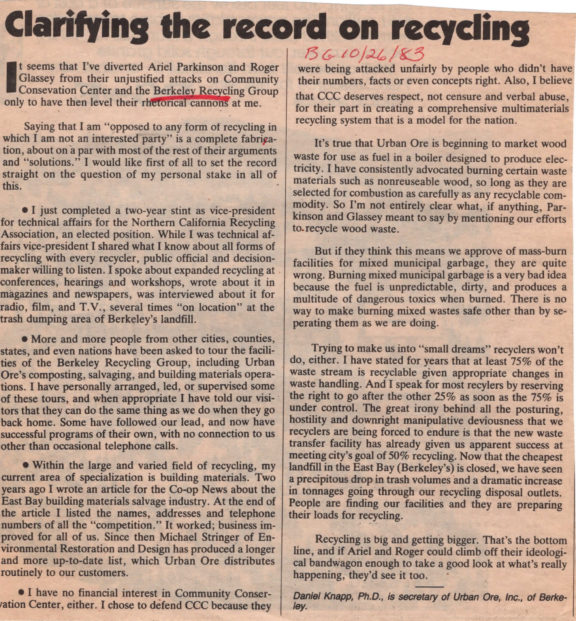The rapid development of the recycling system in Berkeley in the 70s led to controversy in the 80s. Known as the recycling wars, the city and several recycling groups were in conflict with each other for which organizations would do what. Ultimately the recycling wars were due to different interests and ideas coming into conflict in the as a city system was formalized with the new waste transfer facility. These differences are illuminated through Dan Knapps fiery response to being accused of only having financial interests in development of the recycling industry. The recycling wars were complicated and involved several organizations.
The editorial aggressively defends the Berkeley Recycling Group (BRG) and reputation of the author, Dan Knapp as a committed to recycling as a solution to environmental issues, not just for financial gain in his business. The editorial reveals the tone and frustration of the conflicting visions for recycling.
BRG was a coalition between the Ecology Center, Community Conservation Center (CCC) and Urban Ore. The first two emerged as pioneers of recycling in the 70s while Urban Ore joined the effort a little later. The three organizations each had a role in minimizing the waste stream. The Ecology Center promoted education with the community and collected recyclables for the city to be delivered to the transfer station . Community Conservation Center ran several drop off centers and managed the transfer station. Urban Ore scavenged the remaining waste for items that could be reused, like building materials and furniture, and recycled, like scrap metal that had to be deconstructed. They each had a specific role in handling waste. Compared to the recycling efforts in the 70s, the 80s got into technicalities and specialization to be more effective. CCC had to be defended because their contract was put up for bid by the city when they did not support the installation of a trash burner as part of the transfer station. Knapp references the issue and denounces the burning of trash as harmful and unethical in the 9th paragraph of the editorial.
